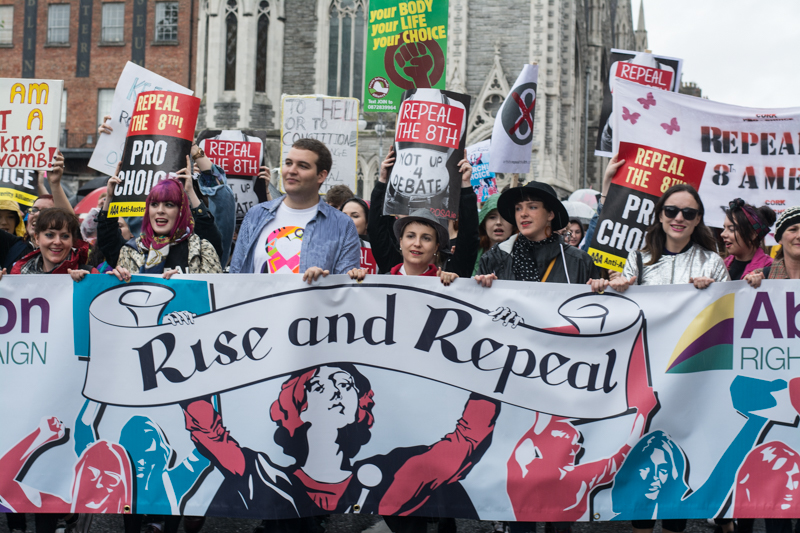Abortion rights have become an international issue in recent weeks with US President-elect, Donald Trump, suggesting that Roe v. Wade may be overturned under his presidency, along with the right-wing Polish government attempting to bring in stricter abortion laws. Opinion polls at home suggest that the majority of Irish people do, however, want to see some form of alteration in our abortion laws, although the level of change desired is varied. As the Citizens’ Assembly continues to deliberate on whether a referendum should be held on the eighth amendment, one thing remains clear: the campaign advocating for repeal is largely failing to engage in any proper discussion, is speaking to itself and has been engulfed by voices on the far left.
Articles have been published in this newspaper, and in other student newspapers, about the difficulties “pro-life” students face in articulating their views on the subject. These students should have every right to express their opinions on this divisive issue and should feel comfortable doing so. Indeed, last year Trinity College Dublin Students’ Union (TCDSU) held a panel discussion on repealing the eighth amendment which consisted of five “pro-choice” speakers and acted as effectively a cheerleading practice. Granted, Trinity’s Law Society (LawSoc) and other societies have, this year, held discussions and debates where both sides of the argument have been represented. This is a welcome change, however, if I held “pro-life” views, I still don’t think I would feel very comfortable expressing them within Trinity’s walls.
Many advocating for repeal would rather shout down opposing voices than engage in proper dialogue with them
This lack of debate also pervades the wider repeal campaign. Many advocating for repeal would rather shout down opposing voices than engage in proper dialogue with them. To an extent, discussion has been replaced with the wearing of a jumper. Outrage has also ensued when a government minister supported an assembly to properly discuss this delicate issue and anyone who doesn’t hold “pro-choice” views are deemed to be religiously motivated misogynists. As someone who wants to see greater access to abortion for women in this country, I am increasingly worried that the campaign seeking to bring about such change is doing more harm than it is good.
It must be realised that Trinity’s liberal bubble is nowhere near representative of Ireland as a whole. To a great extent, we live in our own echo chamber. This argument has to be won as much in rural parts of the country as it does in more cosmopolitan areas if a referendum is to be passed. At present, there is very little being done to win over undecided voters. Painting the issue as black-and-white and failing to recognise that a large proportion of voters see abortion as a grey area will invariably damage the campaign’s reach. Repeal supporters, including younger generations, claim that because abortion is, in their minds, a human rights issue, it should be legalised. Unfortunately, this will not be a convincing enough argument to sway middle ground voters if and when a referendum is held.
As I attended the “march for choice” back in September, another thing that struck me was the very visible presence of left wing groups such as Anti-Austerity Alliance–People Before Profit (AAA-PBP). The large banners and stickers were difficult to miss, along with those selling copies of the Socialist newspaper. This is another problem with the campaign: the left like to claim this issue as their own and, as a result, fail to form any broad coalitions. Issues such as this should transcend party politics. Political stunts such as wearing Repeal jumpers into the Dáil chamber and angrily waving abortion pills at government ministers might get some airtime on social media and the nine o’clock news, but it will do more to disillusion the average voter than persuade them that women in Ireland should have greater access to abortion.
The repeal campaign does have time to get its act together and become more diverse and cohesive
Moderate politicians and others across the political divide who support repealing the eighth amendment must now stand up and be heard. Since the government – which seems to be currently held together by a proverbial shoestring – has declared that a referendum won’t be held on this issue until 2018 at the earliest, time is thankfully on the side of the campaign backing a repeal of the eighth amendment. A good start would be to come to a consensus on what system should be put in place if the eighth amendment were to be repealed. This is the biggest cause for concern amongst middle-ground voters who currently look at a campaign where some factions only want access to abortion in cases of rape, incest and fatal foetal abnormalities, while others want access to abortion right up to and including during the third trimester of a pregnancy.
If 2016 has taught us anything, it is that politics can be an unpredictable game and pollsters have a tendency to get results majorly wrong. If a referendum on repealing the eighth amendment was put to the Irish people tomorrow, it is my view, and the view of many, that it would fail. Luckily, the repeal campaign does have time to get its act together and become more diverse and cohesive. It also needs to send out a coherent message and be more willing to engage in proper debate and discussion. If it does not, the referendum will fail. Irish women will continue to be forced to travel abroad to receive terminations and the argument will be lost for a generation. If that happens, we will only have ourselves to blame.







